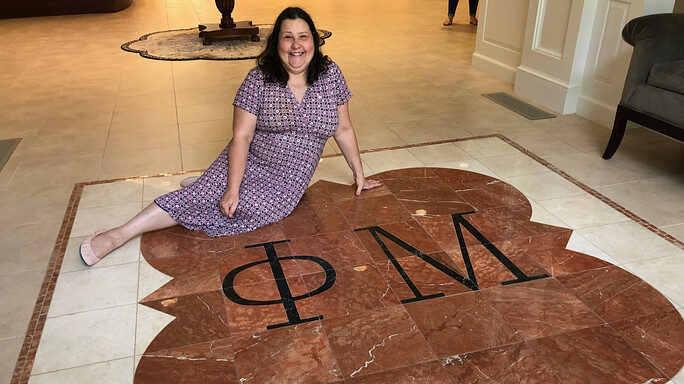Leaders of the national sorority Phi Mu threatened to place restrictions on or revoke the membership of more than a dozen alumni after they questioned a series of changes allegedly made to the sorority’s bylaws, including the decision to allow men to join as “sisters,” according to documents reviewed by Independent Women’s Forum.
In the case of alumna Michele Bunker, from South Carolina, the sorority’s governing body acted on that threat, revoking her membership entirely.
Phi Mu documents cite “contributing in any manner to the impairment of the welfare or prestige” of Phi Mu as cause for this action, but Bunker said the decision was clearly made in retaliation for her objection to Phi Mu’s allowing men who identify as transgender to join as members.
IWF reached out to Phi Mu and received a response stating, “Phi Mu empowers our collegiate members to make decisions on who will receive an invitation to join their chapter. Collegiate chapters have the autonomy, and the responsibility, of selecting new members.”
In March 2023, Bunker and two friends started a Facebook page to call attention to changes to the faith elements of the sorority and to gauge how other members felt about them.
According to Bunker, Phi Mu removed many faith elements from their Ritual and Creed, which Bunker said were once a core part of the sorority’s identity and the reason why she joined. After learning of these changes at the national convention in Phoenix in July 2022, Bunker felt compelled to look into what else might be changing within her sorority and to learn how other sorority alumni felt about those changes.
Soon, she said, women on the Facebook page she created began to talk about other changes, such as Phi Mu chapters allegedly initiating males. (These individuals were observed to have visible male characteristics like Adam’s apples and five o’clock shadow.) As this happened, Bunker said she began facing backlash on the official Phi Mu alumni page.
Bunker was an active and committed Phi Mu alumna. When she was a student at the University of South Carolina Aiken, she joined the millions of young women nationwide who have become a part of Greek life. She served as chaplain, alumni relations chair, and eventually as vice president for her chapter. After graduating, she served as an academic adviser, ritual adviser, and chapter adviser to collegiate Phi Mus before becoming the vice president of her alumni group in Augusta, Ga.
These and other roles, as well as her personal philanthropy, led national leadership to induct Bunker into the Trestella Society in 2022 as a way to honor her.
She continued to attend every Phi Mu convention, year after year, so Bunker thought she would at least be aware if the National Council was making significant changes to its bylaws.
In 2018, Phi Mu quietly changed its definition of “woman” to include anyone identifying as a woman, “regardless of their biological sex at birth.” This change was reflected in Phi Mu’s Standing Rules and Procedures, to which Bunker provided IWF access.
Bunker said leadership covered up this fundamental change by reportedly making a new standing rule allowing for such changes to be made without informing the whole convention body or the membership at large.
“It was intentionally kept secret,” she alleged.
After raising awareness of the policy change on the Facebook page she made, Bunker said that women on the official Phi Mu Facebook page began to speak ill of her.
“I was called a Southern pearl clutcher, I was called transphobic, I was called ignorant,” she said. “But I don’t have anything to be embarrassed about what I’ve posted. I’ve never threatened anyone. I’ve never attacked someone personally. The only thing I’ve said is that Phi Mu is not for biological men and that I will not accept a biological man as my sister — that I can’t.”
In July, Bunker said she and 14 other active members of her Facebook page were sent referral letters from the national Phi Mu Honor Policy and Referral Committee threatening to rescind their membership.
According to Bunker, the alumni had never before been called out by this committee. It felt “very patronizing” since the committee had always been used for college girls, not grown women who had been out of college for several decades. This action was the result of another rule change to allow alumni to be brought before the committee. And in another break with past practice, the committee skipped over the prescribed accountability process and went straight to revoking a sister’s membership — in the first sentence of the letter.
The changes raised red flags for Bunker, who felt that they could be weaponized against women who had opinions that new, progressive Phi Mu leadership didn’t like.
“When I was 18 and made that lifelong commitment, I never signed up for the rest of my life that ‘Phi Mu gets to monitor my beliefs and opinions and say they like it or don’t like it and get to judge me,’” Bunker said. “That’s not what any of us signed up for.”
When Bunker asked what specifically she had done wrong, she received four referrals via email. One of them accused Bunker of “essentially” leading “a mutiny” against Phi Mu. To address their alleged violations, the committee asked Bunker and five other alumni to appear before Zoom hearings. Bunker said that a few of the 14 cases were dismissed with the caveat that the women must exhibit “good behavior,” but six of the women had to proceed with committee hearings.
“I can say with sincerity I have never been treated so badly by a group of people as I was by the Honor Policy and Referral Committee,” Bunker said. “Never.”
Bunker’s main transgression, she said, appeared to be her position that the sorority shouldn’t accept males. Bunker tried to help them understand her perspective, but even through Zoom, “you could see the eye-rolling,” she said. Bunker said the ordeal felt like a kangaroo court and that the committee had made up their minds before the hearing even began.
“I told them at the meeting, ‘If keeping my membership means that I have to say that a biological man can be my sister, then you’ll have to take my membership because that’s something I will never ever do.’”
That night, five Phi Mus were dismissed from membership. Another was put on probation and required to attend diversity, equity, and inclusion training; take the Harvard Implicit Bias Test; listen to certain podcast episodes for “reeducation,” and then write a reflection paper. After completing these tasks, the woman is still at risk of having her membership taken away.
After her own membership was revoked, Bunker said she received an outpouring of support from other Phi Mu alumni saying she will always be their sister.
She may no longer be “‘entitled to the rights and privileges of membership,’” Bunker says, but “it will still be in my obituary that ‘She was a Phi Mu.’”
Bunker regrets that, after she had started a family tradition by giving the gift of Phi Mu sisterhood to her eldest daughter, the national organization had “broken that trust.”
“I have a ring with the Phi Mu badge. They made a ring with my grandmother’s wedding band. My youngest has always looked at that ring, and she’s loved it. I’ve always told her, ‘Someday when you go to college, if you’re a Phi Mu, someday this ring will be yours.’”
With her youngest daughter about to begin college, Bunker would love for her to try Greek life. But now, she doesn’t want her to rush Phi Mu.
“There’s a much bigger picture. If Phi Mu can do this, then what’s next?” Bunker asked, contemplating how several organizations under the umbrella of the National Panhellenic Conference (NPC), such as Kappa Kappa Gamma, have taken similar actions. “If I have to give up my membership and I have to lose my battle to win this war, so be it. . . . We can’t be afraid of them anymore, and we can’t hide.”
This op-ed was published by National Review.










